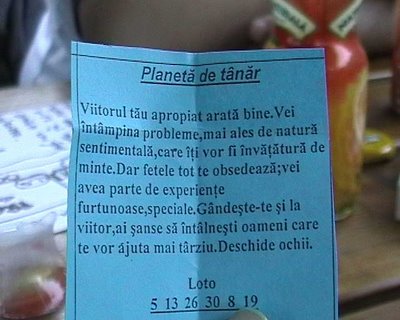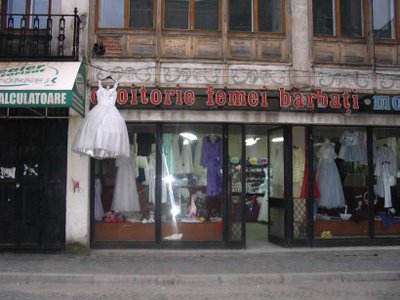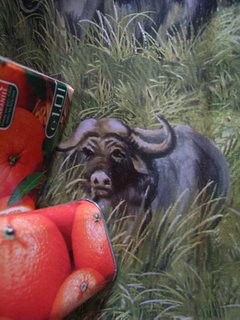DOAR MÂINE
un proiect video de Nita Mocanu si Marius Stoica
Însă de câte ori visarea cu ochii deschişi este surprinsă de conştiinţa noastră, ba chiar mai mult, de câte ori suntem conştienţi de faptul că o anumită proiecţie mentală ne defineşte o decizie sau alta. Lumea în care trăim este o lume a "bunului simţ" sau mai abstract spus este o lume a raţionalităţii: omul este în primul rând determinat de raţiune, intenţionalitate şi măsură. Orice vis, dorinţă sau proiecţie mentală este mai întâi raţionalizată, iar apoi transformată într-o intenţie pe baza căreia se poate lua o decizie. (Visarea este omisă prin abstractizare şi cuantificare.) Ştiinţa spune ca aşa funcţionează mintea umană, însă nimeni nu ştie (dacă e să urmăm mot-a-mot firul raţiunii) cât de universală sau relativă este această concluzie, aşa cum nici despre ştiinţa însăşi şi civilizaţia în care trăim nu poate şti. Poate că visele, proiecţiile şi dorinţele noastre cele mai neobişnuite sunt la fel de valabile şi la fel de importante precum raţiunea.[1] Tocmai de aceea spiritualitatea în sens larg va rămâne marca oricărei civilizaţii a oricărui timp.
Personal, fiecare dintre noi îşi trăieşte propriile vise şi dorinţe. Însă lumea în care suntem este cea care ne rezervă cadrele, exemplele şi momentele acestei trăiri. În România de astăzi este din ce în ce mai dificil să ştii dacă visele şi dorinţele personale le trăieşti pentru că îţi sunt proprii sau pentru că aşa te defineşte societatea. Înainte de 1989, fiecare dintre noi era oarecum sigur de visele şi dorinţele sale - era normal să visezi mult şi introspectiv, asta pentru că regimul autoritar în care trăiam nu dădea şansa niciunei împliniri practice. Imediat după ‘89, multe dintre acele vise au devenit realitate şi nu mă refer aici la libertate şi dreptate, ci la acele mici proiecţii mentale şi reverii care au creat infrastructura şi etosul în care trăim: de la micile buticuri ABC în care se transfigurau tot felul de elemente mai mult sau mai putin comerciale (de exemplu, numele sau construcţia ca atare) pînă la transpunerea anumitor vise în diverse cărţulii şi revistuţe de yoga, science-fiction sau paranormal.
Astăzi, în 2006, toate acestea par naive şi depăşite. Majoritatea oamenilor sunt cotropiţi de proiecţiile mentale ale culturii politice şi economice dominante, în care totul, inclusiv sau poate chiar în special visatul cu ochii deschişi este stimulat dar condiţionat de acestă lume care tinde sa devină sufocantă şi chiar tiranică însă la modul revers perioadei de dinainte de 89: nu privarea de bunuri materiale şi informaţie te inrobeşte, ci condiţionarea la consumism.
Totuşi, în mijlocul acestei lumii precare, noi continuăm să visăm cu ochii deschişi şi continuăm să reflectăm, mai mult sau mai puţin condiţionat, proiecţiile noastre mentale în mediul care ne înconjoară. In viaţa personală, în relaţia cu cei apropiaţi nouă şi în spaţiul cotidian se ascunde o bogăţie infinită dar simplă şi de aceea invizibilă, a viselor şi speranţelor noastre.
"Doar mâine" este o călătorie in lumea reveriilor locale. Interacţiunea în cadrul acestei călătorii este liberă şi nemediată, camera de filmat şi noi fiind martori simpli ai răstimpului petrecut alături de conlocutorii noştri. Vizita prin atelierele de exersare a unui viitor posibil, în care sunt aduse poveşti personale, experienţe diverse, se constituie ca parte fluidă a propriei noastre reverii legate de acest proiect.
[1] Acest lucru este analog cu cee ce Stoicii spuneau, la nivel filosofic, că atunci când spui car un car iţi trece prin gură.
Tuesday, June 27, 2006
doar maine - despre proiect
jos guvernul / down with the guvernment
 (ceea ce se vede in imagine este o firma luminoasa) Am fost la manifestatiile sindicalistilor din mai in Bucuresti. S-a scandat si "Jos guvernul !". Nu cred ca era vorba de a da jos guvernul definitiv ci de al inlocui cu un altul mai bun... In contextul asta, lozinca parea redundanta si inertiala, doar un cliseu de revolta. (Un guvern care respecta aceleasi conditionari economice politice si sociale cu greu va putea fi mai bun.Nu poate exista un guvern mai bun pt ca lumea in care traim are deja facute conditionarile politice iar un guvern mai ales in romania doar le respecta, el este doar o aparenta pt ordinea lumii...) un text de Joanne Richardson "The radical left in the postcommunist epoch"http://romania.indymedia.org/en/2005/10/1061.shtml
(ceea ce se vede in imagine este o firma luminoasa) Am fost la manifestatiile sindicalistilor din mai in Bucuresti. S-a scandat si "Jos guvernul !". Nu cred ca era vorba de a da jos guvernul definitiv ci de al inlocui cu un altul mai bun... In contextul asta, lozinca parea redundanta si inertiala, doar un cliseu de revolta. (Un guvern care respecta aceleasi conditionari economice politice si sociale cu greu va putea fi mai bun.Nu poate exista un guvern mai bun pt ca lumea in care traim are deja facute conditionarile politice iar un guvern mai ales in romania doar le respecta, el este doar o aparenta pt ordinea lumii...) un text de Joanne Richardson "The radical left in the postcommunist epoch"http://romania.indymedia.org/en/2005/10/1061.shtml
believing in impossible
William Blake says in one of his texts: “all that today is a reality was once only part of an impossible dream,” and that is why today we have the airplane, space exploration, the computer with which I am writing this column, and so on. In Lewis Carroll’s famous masterpiece “Alice through the Looking Glass,” there is a dialogue between the main character and the Queen, who has just told something quite extraordinary.
- I can’t believe it – says Alice.
- Can’t believe it? – the Queen repeats with a sad look on her face. – Try again: take a deep breath, close your eyes, and believe.
Alice laughs:
- It’s no good trying. Only fools believe that impossible things can happen.
- I think what you need is a little training – answers the Queen. – When I was your age I would practice at least half an hour a day, right after breakfast, I tried very hard to imagine five or six unbelievable things that could cross my path, and today I see that most of the things I imagined have turned real, I even became a Queen because of that.
Life constantly asks us: "believe!” Believing that a miracle can happen at any moment is necessary not only for our happiness but also for our protection, or to justify our existence. In today’s world, many people think it is impossible to put an end to misery, to build a fair society, and to alleviate the religious tension that seems to grow worse every day.
Most people avoid the struggle for a whole variety of reasons: conformism, maturity, the sense of the ridiculous, the feeling of impotence. We see injustice being done to our neighbor and remain silent. "I’m not getting involved in fights for nothing" is the explanation.
This is a cowardly attitude. Whoever travels down a spiritual path carries an honor code to be fulfilled; the voice that is raised against what is wrong is always heard by God.
Even so, now and again we hear the following comment:
“I always believe in dreams, I often try to combat injustice, but I always end up disappointed.”
A warrior of light knows that certain impossible battles are worth fighting and so is not afraid of being disappointed, knowing as he does the power of his sword and the force of his love. He vehemently rejects those who are unable to take decisions and are always trying to pass on to others the responsibility for all the bad that happens in the world.
If he does not fight against what is wrong – even if it seems beyond his strength – he will never find the right way.
My Iranian publisher, Arash Hejasi, once sent me a text that said:
“Today a heavy rainstorm caught me by surprise when I was walking down the street ... thank God I had my umbrella and raincoat. Except that they were both in my car, parked quite a distance away. While I was running to get them I thought what a strange sign I was receiving from God – we always have the necessary resources to face the storms that life prepares for us, but most times these resources are locked away in the bottom of our heart and this makes us waste an enormous amount of time trying to find them, so that when we finally find them, we have already been defeated by adversity.”
So, let us always be prepared; otherwise we will miss our chance, or lose the battle.
lacrimioare
decoratiuni interioare / interior decorations- explicatii
Termenul de decoratiuni interioare este atat unul tehnic, al specialistului care se ocupa de amenajarea interioarelor unor casa, cladiri cat si un joc de cuvinte, care ar dori sa sugereze modul in care totul devine o "decoratiunie" , obiecte de decor care sunt asezate conform unor scheme prestabilite sau conform creativitatii celui care o face. Ma intereseaza jocul interior/exterior, masura in care exeteriorul, lumea obiectiva, se infiltreaza in interiorul lumii subiective. Cum devii ceea ce te defineste.
..........................................................................................................................The term interior decorations is also a technical one , of the specialist how takes care of the interior arrangement of some houses, buildings, and also a quibble (words play) , trough which I would like to suggest the way in which everything becomes "decoration" , objects in a background that are arranged using a prescribed scheme or trough the creativity of the one who does this thing. I'm interested in the play between interior / exterior, the amount in which the exterior, the objective world in infiltrating the interior of the subjective world. How one becomes what it is defined to be.
Sau invers.................
Or the other way around.
Our Posthuman Future- Fukuyama
text from
http://www.fsgbooks.com/fsg/ourposthumanfutureexcrpt.htm
In Brave New World... the evil is not so obvious because no one is hurt; indeed, this is a world in which everyone gets what they want. As one of the characters notes, "The Controllers realized that force was no good," and that people would have to be seduced rather than compelled to live in an orderly society. In this world, disease and social conflict have been abolished, there is no depression, madness, loneliness, or emotional distress, sex is good and readily available. There is even a government ministry to ensure that the length of time between the appearance of a desire and its satisfaction is kept to a minimum. No one takes religion seriously any longer, no one is introspective or has unrequited longings, the biological family has been abolished, no one reads Shakespeare. But no one (save John the Savage, the book's protagonist) misses these things, either, since they are happy and healthy.
Since the novel's publication, there have probably been several million high school essays written in answer to the question, "What's wrong with this picture?" The answer given (on papers that get A's, at any rate) usually runs something like this: the people in Brave New World may be healthy and happy, but they have ceased to be human beings. They no longer struggle, aspire, love, feel pain, make difficult moral choices, have families, or do any of the things that we traditionally associate with being human. They no longer have the characteristics that give us human dignity. Indeed, there is no such thing as the human race any longer, since they have been bred by the Controllers into separate castes of Alphas, Betas, Epsilons, and Gammas who are as distant from each other as humans are from animals. Their world has become unnatural in the most profound sense imaginable, because human nature has been altered. In the words of bioethicist Leon Kass, "Unlike the man reduced by disease or slavery, the people dehumanized à la Brave New World are not miserable, don't know that they are dehumanized, and, what is worse, would not care if they knew. They are, indeed, happy slaves with a slavish happiness.
But while this kind of answer is usually adequate to satisfy the typical high school English teacher, it does not (as Kass goes on to note) probe nearly deeply enough. For one can then ask, What is so important about being a human being in the traditional way that Huxley defines it? After all, what the human race is today is the product of an evolutionary process that has been going on for millions of years, one that with any luck will continue well into the future. There are no fixed human characteristics, except for a general capability to choose what we want to be, to modify ourselves in accordance with our desires. So who is to tell us that being human and having dignity means sticking with a set of emotional responses that are the accidental by-product of our evolutionary history? There is no such thing as a biological family, no such thing as human nature or a "normal" human being, and even if there were, why should that be a guide for what is right and just? Huxley is telling us, in effect, that we should continue to feel pain, be depressed or lonely, or suffer from debilitating disease, all because that is what human beings have done for most of their existence as a species. Certainly, no one ever got elected to Congress on such a platform. Instead of taking these characteristics and saying that they are the basis for "human dignity," why don't we simply accept our destiny as creatures who modify themselves?
living my life (quote)
(...) I became alive once more. At the dances I was one of the most untiring and gayest. One evening a cousin of Sasha, a young boy, took me aside. With a grave face, as if he were about to announce the death of a dear comrade, he whispered to me that it did not behoove an agitator to dance. Certainly not with such reckless abandon, anyway. It was undignified for one who was on the way to become a force in the anarchist movement. My frivolity would only hurt the Cause.
I grew furious at the impudent interference of the boy. I told him to mind his own business, I was tired of having the Cause constantly thrown into my face. I did not believe that a Cause which stood for, a beautiful ideal, for anarchism, for release and freedom from conventions and prejudice, should demand the denial of life and joy. I insisted that our Cause could not expect me to became a nun and that the movement should not be turned into a cloister. If it meant that, I did not want it. "I want freedom, the right to self-expression, everybody's right to beautiful, radiant things." Anarchism meant that to me, and I would live it in spite of the whole world --- prisons, persecution, everything. Yes, even in spite of the condemnation of my own closest comrades I would live my beautiful ideal. (...)
Emma Goldman
Living my lifela cafea
 Cred ca un mare vis, cel al vietii bogate si confortabile fara griji tocmai s-a spart printre miile de obiecte inutile pe care le cumparam pantru a putea visa, in schimb un alt vis persista cu insistenta, cel al proprietatii, sa ai cat mai multe bucatele din visul de care spuneam, si sa fie numai ale tale. Poate asa esti mai aproape de ceea ce omenirea a urmarit intotdeauna, abolirea suferintei si neajunsurilor...
Cred ca un mare vis, cel al vietii bogate si confortabile fara griji tocmai s-a spart printre miile de obiecte inutile pe care le cumparam pantru a putea visa, in schimb un alt vis persista cu insistenta, cel al proprietatii, sa ai cat mai multe bucatele din visul de care spuneam, si sa fie numai ale tale. Poate asa esti mai aproape de ceea ce omenirea a urmarit intotdeauna, abolirea suferintei si neajunsurilor...
















